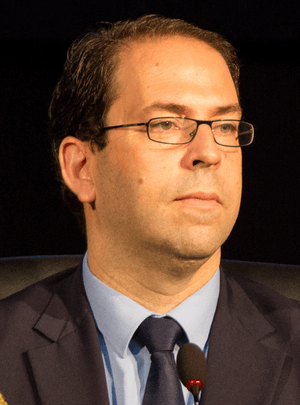Youssef Chahed facts for kids
Quick facts for kids
Youssef Chahed
|
|
|---|---|
|
يوسف الشاهد
|
|

Chahed in 2016
|
|
| Prime Minister of Tunisia | |
| In office 27 August 2016 – 27 February 2020 |
|
| President | Beji Caid Essebsi Mohamed Ennaceur (acting) Kais Saied |
| Preceded by | Habib Essid |
| Succeeded by | Elyes Fakhfakh |
| President of Tahya Tounes | |
| Assumed office 2 June 2019 |
|
| Preceded by | Position established |
| Personal details | |
| Born | 18 September 1975 Tunis, Tunisia |
| Political party | Al Joumhouri (2012) Nidaa Tounes (Before 2019) Tahya Tounes (2019–present) |
| Education | Tunis University National Institute of Agriculture, Paris-Grignon |
Youssef Chahed (Arabic: يوسف الشاهد; born 18 September 1975) is a Tunisian politician. He served as the 14th prime minister of Tunisia from August 27, 2016, to February 27, 2020. A prime minister is like the head of the government in many countries. Before this, he was a Secretary of State for Fisheries and a Minister of Local Affairs.
Mr. Chahed was a member of the Nidaa Tounes political party. Later, he started his own party called Tahya Tounes. He became the president of Tahya Tounes on June 2, 2019. By profession, he is an agricultural engineer, a researcher, and a university professor.
Contents
Education and Early Career
Youssef Chahed was born in Tunis, the capital city of Tunisia, in 1975. He studied to become an agricultural engineer. This means he learned about farming, crops, and how to manage land. He graduated from the National Agricultural Institute of Tunisia in 1998. He was the top student in his class.
After that, he went to France to continue his studies. He attended the National Institute of Agriculture, Paris-Grignon. In 1999, he earned a special diploma in environmental economics. This field looks at how the economy and the environment affect each other. In 2003, he earned a PhD. A PhD is a very high university degree, showing deep knowledge in a subject. His PhD was in agricultural economics.
Until 2009, Mr. Chahed taught agricultural economics. He taught at the Higher Institute of Agriculture in France. He also taught as a visiting professor in other countries. He is very good at languages. He can speak Arabic, French, English, and Italian fluently.
Becoming Prime Minister
In August 2016, the previous Prime Minister of Tunisia, Habib Essid, lost a vote in parliament. This meant he could no longer lead the government. The Nidaa Tounes party then chose Youssef Chahed to be the next head of government.
On August 26, 2016, the Tunisian parliament voted on his new government. Out of 194 votes, 167 were in favor. This meant his government was approved. The President of Tunisia, Beji Caid Essebsi, then officially appointed him as prime minister. Before this, many people did not know much about Youssef Chahed in politics.
Key Actions as Prime Minister
During his time as prime minister, Youssef Chahed worked to make the government stronger. He wanted to make sure the government had clear authority. He took steps to improve security in the country. For example, he banned the wearing of the niqab (a full face veil) in public buildings for safety reasons in 2019.
His government also worked on important laws. In 2017, a historic law was passed to help end violence against women and girls. This was a big achievement in the Muslim Arab world.
In 2018, his government suggested a new law. This law was about stopping all forms of racial discrimination. On October 9, Tunisia's parliament passed this law. It made racial discrimination illegal and defined what it meant. This was an important step for the rights of black Tunisians and immigrants from other African countries.
In 2019, after some bombings in Tunis, the Chahed government also banned the burqa (another type of full face veil). Later that year, Mr. Chahed announced he would run for president in the 2019 Tunisian presidential election.
After his time as prime minister, Dr. Youssef Chahed became a Senior Fellow at Harvard Kennedy School's Belfer Center. This was for the years 2022-2024. During this time, he focused on challenges facing the Middle East and North Africa. These challenges included economic issues and security. He also led a study group on how countries develop and become more democratic. He met with students and spoke at events at Harvard University.
Austerity Measures
In 2018, there were protests in Tunisia. These protests happened because of a new law called the Finance Act. This law started on January 1, 2018. It raised taxes on many things. These included gasoline, phone cards, housing, internet use, hotel rooms, and some foods. Customs taxes on makeup and some farm products also went up.
Some opposition parties called for more protests. They said the government's new measures were "unjust." Prime Minister Youssef Chahed spoke about the protests. He asked people to stay calm and said he believed 2018 would be the "last difficult year" for Tunisians.
See also
 In Spanish: Youssef Chahed para niños
In Spanish: Youssef Chahed para niños

